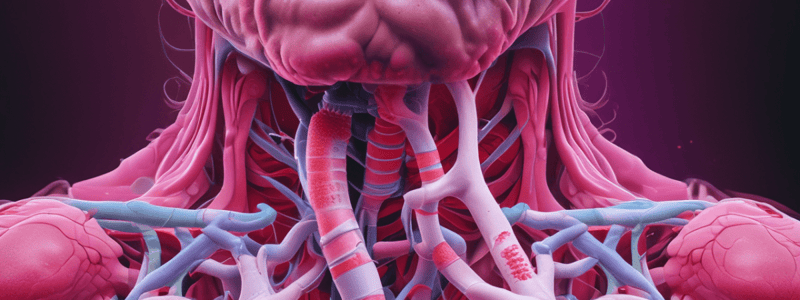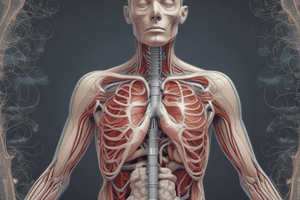Podcast
Questions and Answers
Which of the following is NOT a common predisposing factor for tuberculosis?
Which of the following is NOT a common predisposing factor for tuberculosis?
- Alcohol abuse
- Hyperthyroidism (correct)
- Diabetes mellitus
- Immunosuppression
In the pathogenesis of tuberculosis, what is the initial reaction after the first infection with mycobacteria?
In the pathogenesis of tuberculosis, what is the initial reaction after the first infection with mycobacteria?
- Tissue necrosis
- Macrophage ingestion (correct)
- Healing and calcification
- Delayed hypersensitivity reaction
Which of the following is a characteristic of secondary tuberculosis?
Which of the following is a characteristic of secondary tuberculosis?
- Disseminated granulomas in many organs
- Often resolves on its own
- Small granulomas in the lobes (Ghon complex)
- Lesions in the apices with caseous necrosis in granulomas (correct)
Which type of tuberculosis is characterized by disseminated granulomas in many organs?
Which type of tuberculosis is characterized by disseminated granulomas in many organs?
What is the primary method of transmission for tuberculosis?
What is the primary method of transmission for tuberculosis?
What is the recommended treatment for tuberculosis?
What is the recommended treatment for tuberculosis?
Which of the following is the most common cause of community-acquired acute pneumonia?
Which of the following is the most common cause of community-acquired acute pneumonia?
What is the main difference between bronchopneumonia and lobar pneumonia?
What is the main difference between bronchopneumonia and lobar pneumonia?
What is the primary defense mechanism of the respiratory system?
What is the primary defense mechanism of the respiratory system?
What are the two main subtypes of influenza A virus that have established stable lineages in the human population?
What are the two main subtypes of influenza A virus that have established stable lineages in the human population?
Which of the following is the most important factor in the spread of influenza virus?
Which of the following is the most important factor in the spread of influenza virus?
What is the typical incubation period for influenza?
What is the typical incubation period for influenza?
What is the main symptom that distinguishes influenza from the common cold?
What is the main symptom that distinguishes influenza from the common cold?
Which type of pneumonia is more common in elderly patients and those with debilitating diseases?
Which type of pneumonia is more common in elderly patients and those with debilitating diseases?
What is the typical clinical presentation of lobar pneumonia?
What is the typical clinical presentation of lobar pneumonia?
What is the primary investigation used to diagnose pneumonia?
What is the primary investigation used to diagnose pneumonia?
Gram-negative organisms are the most common cause of hospital-acquired pneumonia.
Gram-negative organisms are the most common cause of hospital-acquired pneumonia.
Tuberculosis is the leading cause of death globally from a single infectious disease.
Tuberculosis is the leading cause of death globally from a single infectious disease.
Miliary tuberculosis is characterized by localized lesions in the lung apices.
Miliary tuberculosis is characterized by localized lesions in the lung apices.
The primary method of transmission for tuberculosis is through direct contact with infected individuals.
The primary method of transmission for tuberculosis is through direct contact with infected individuals.
Pneumonia complications include lung abscess and empyema, but not respiratory failure.
Pneumonia complications include lung abscess and empyema, but not respiratory failure.
The BCG vaccine is used to prevent tuberculosis, but it is not effective in developed countries.
The BCG vaccine is used to prevent tuberculosis, but it is not effective in developed countries.
Influenza virus belongs to the picornavirus group.
Influenza virus belongs to the picornavirus group.
The primary method of spread for influenza virus is by fomites.
The primary method of spread for influenza virus is by fomites.
Rhinoviruses are responsible for causing influenza infections.
Rhinoviruses are responsible for causing influenza infections.
Pneumonia can only be caused by bacterial infections.
Pneumonia can only be caused by bacterial infections.
Lobar pneumonia typically affects elderly patients.
Lobar pneumonia typically affects elderly patients.
In bronchopneumonia, inflammation is diffuse and affects the entire lobe.
In bronchopneumonia, inflammation is diffuse and affects the entire lobe.
Pulmonary fibrosis is classified as one of the common chronic lung diseases.
Pulmonary fibrosis is classified as one of the common chronic lung diseases.
Tuberculosis is caused by a virus.
Tuberculosis is caused by a virus.
The primary symptom of pneumonia is severe headache.
The primary symptom of pneumonia is severe headache.
Bronchioles contain cartilage in their structure.
Bronchioles contain cartilage in their structure.
In the pathogenesis of tuberculosis, the initial reaction after the first infection with mycobacteria involves macrophage ingestion and interaction with T-cells, leading to the development of cellular immunity and a delayed hypersensitivity reaction.
In the pathogenesis of tuberculosis, the initial reaction after the first infection with mycobacteria involves macrophage ingestion and interaction with T-cells, leading to the development of cellular immunity and a delayed hypersensitivity reaction.
The BCG (bacille Calmette-Guerin) vaccination is effective in preventing tuberculosis in developed countries, but not in developing countries.
The BCG (bacille Calmette-Guerin) vaccination is effective in preventing tuberculosis in developed countries, but not in developing countries.
Miliary tuberculosis is characterized by localized lesions in the lung apices, rather than disseminated granulomas in many organs.
Miliary tuberculosis is characterized by localized lesions in the lung apices, rather than disseminated granulomas in many organs.
In hospital-acquired pneumonia, the causative organisms are often Gram-negative, and the treatment should be modified based on culture and sensitivity results.
In hospital-acquired pneumonia, the causative organisms are often Gram-negative, and the treatment should be modified based on culture and sensitivity results.
The recommended treatment for tuberculosis involves a combination of three or four different kinds of antibiotics taken over a period of six to nine months.
The recommended treatment for tuberculosis involves a combination of three or four different kinds of antibiotics taken over a period of six to nine months.
In the pathology of secondary tuberculosis, lesions are typically found in the lung bases, rather than the apices.
In the pathology of secondary tuberculosis, lesions are typically found in the lung bases, rather than the apices.
The influenza virus undergoes major antigenic shifts, leading to pandemics.
The influenza virus undergoes major antigenic shifts, leading to pandemics.
Bronchopneumonia is characterized by diffuse inflammation affecting the entire lobe of the lung.
Bronchopneumonia is characterized by diffuse inflammation affecting the entire lobe of the lung.
The main defense mechanism of the respiratory system is the presence of ciliated epithelium.
The main defense mechanism of the respiratory system is the presence of ciliated epithelium.
Influenza vaccines target the M2 protein, which is highly conserved across different strains.
Influenza vaccines target the M2 protein, which is highly conserved across different strains.
Streptococcus pneumoniae is the most common cause of hospital-acquired pneumonia.
Streptococcus pneumoniae is the most common cause of hospital-acquired pneumonia.
In lobar pneumonia, pleural exudate is uncommon.
In lobar pneumonia, pleural exudate is uncommon.
The incubation period for influenza is typically 1-3 weeks.
The incubation period for influenza is typically 1-3 weeks.
The primary investigation used to diagnose pneumonia is a chest X-ray.
The primary investigation used to diagnose pneumonia is a chest X-ray.
Bronchopneumonia is more common in elderly patients and those with debilitating diseases.
Bronchopneumonia is more common in elderly patients and those with debilitating diseases.
The primary method of transmission for influenza virus is through direct contact with infected individuals.
The primary method of transmission for influenza virus is through direct contact with infected individuals.
Study Notes
- Pneumonia is an inflammation of the alveoli, commonly caused by bacteria, with classifications based on anatomy (lobar pneumonia, bronchopneumonia) and etiology (bacterial, viral).
- Streptococcus pneumoniae is a common cause of community-acquired acute pneumonia, affecting healthy adults between 20-50 years with lobar pneumonia and older individuals, infants, and those with debilitating diseases with bronchopneumonia.
- Clinical features of pneumonia include respiratory symptoms like cough, purulent sputum, and dyspnea, systemic symptoms such as fever, and signs like consolidation and pleural rub.
- Diagnostic investigations for pneumonia involve chest X-ray, blood cell count (>15x10^9/L in bacterial infections), sputum tests (gram stain, culture, sensitivity), and other specific tests for pathogens like Mycoplasma and Legionella.
- Management strategies for community-acquired pneumonia include immediate antibiotic treatment without waiting for microbial results, while hospital-acquired pneumonia often involves Gram-negative organisms requiring different antibiotics based on culture and sensitivity results.
- Complications of pneumonia may include lung abscess and empyema, highlighting the importance of prompt diagnosis and appropriate treatment to prevent adverse outcomes.
- Tuberculosis, caused mainly by Mycobacterium tuberculosis, remains a significant global health concern as the leading cause of death from a single infectious disease, particularly affecting developing countries but also showing an increasing prevalence in developed nations.
Studying That Suits You
Use AI to generate personalized quizzes and flashcards to suit your learning preferences.
Description
Test your knowledge on the physiology and major diseases of the respiratory tract, focusing on upper respiratory infections, pneumonia, and tuberculosis. Learn about the causes, pathological features, and clinical aspects of these conditions.





